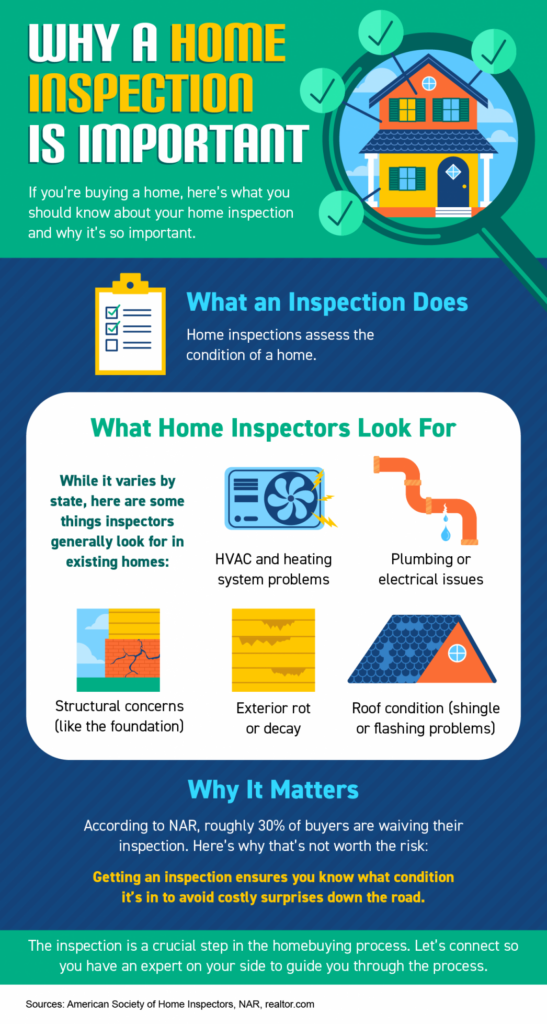When you’re buying a home, there are a lot of steps to complete throughout the process. One of the most critical is the home inspection. It assesses the condition of the home you plan to purchase so you can avoid costly surprises down the road. According to NAR, a home inspection helps a buyer make a more informed decision about the home they are considering buying.
Once your offer is accepted, generally the next step is to have the home inspected. Most real estate agents recommend you make your offer contingent upon a clean home inspection, to protect yourself against buying a home that might have some hidden defects. This contingency allows you to renegotiate the price you offered for the home, ask the sellers to cover repairs, or in some cases, walk away if challenges arise. Your agent can advise you on the best course of action once the report is filed. In this blog, we’ll take a look at this step in the homeownership journey and give you insight on what you should know about your home inspection and why it’s so important.

Why is a Home Inspection Important?
The home inspection is important because it gives an impartial evaluation of the home. Similar to the appraisal, which determines the current value of the home, the inspection determines the current condition of the home. As the American Society of Home Inspectors puts it:
“Home inspections are the opportunity to discover major defects that were not apparent at a buyer’s showing. . . . Your home inspection is to help you make an informed decision about the house, including its condition.”
If there are any concerns during the inspection – an aging roof, a malfunctioning HVAC system, or any other questionable items – you have the option to discuss and negotiate any potential issues with the seller. Your real estate advisor can help you navigate this process and negotiate what, if any, repairs need to be made before the sale is finalized.
Keep in mind – home inspections are critical because they can shed light on challenges you may face as the new homeowner. Without an inspection, serious, sometimes costly issues could come as a surprise later on.
How to Choose an Inspector
Your agent will most likely have a short list of inspectors they’ve worked with in the past to recommend to you. This is a good place to start – since you chose your agent based on trust, it’s likely they work with other trustworthy business owners. But, you have the final say on who you choose to perform your home inspection, so feel free to do your research.
Realtor.com suggests that you consider the following 5 areas when choosing the right home inspector for you:
1. Qualifications – Find out what’s included in your inspection and if the age or location of your home may warrant specific certifications or specialties.
2. Sample Reports – Ask for a sample inspection report so you can review how thoroughly they will be inspecting your dream home. In most cases, the more detailed the report, the better.
3. References – Do your homework. Ask for phone numbers and names of past clients who you can call to discuss their experiences.
4. Memberships – Not all inspectors belong to a national or state association of home inspectors, and membership in one of these groups should not be the only way to evaluate your choice. Membership in one of these organizations does, however, often mean continued training and education are required.
5. Errors and Omission Insurance – Find out what the liability of the inspector or inspection company is once the inspection is over. The inspector is only human, after all, and it is possible they might miss something they should see.
Ask your inspector if it’s okay for you to tag along during the inspection, so they can point out anything that should be addressed or fixed.
What Happens During a Home Inspection?
Home inspectors are looking for plumbing or electrical issues, roof condition, exterior rot or decay, HVAC and heating or cooling system problems, structural and foundation concerts, safety concerns, and any other visible defects that could pose a problem.
Don’t be surprised to see your inspector climbing on the roof or crawling around in the attic and on the floors. The job of the inspector is to protect your investment and find any issues with the home, including but not limited to: the roof, plumbing, electrical components, appliances, heating and air conditioning systems, ventilation, windows, fireplace and chimney, foundation, and so much more.
Bottom Line
They say, ‘ignorance is bliss,’ but not when investing your hard-earned money into a home of your own. Completing a home inspection is a vital part of your homeownership journey, so be sure to choose a professional that will give you a thorough and complete picture of the condition of the house. Working with a professional you can trust will give you the most information possible, so you can make the most educated decision about your purchase. If you’re ready to become a homeowner, let’s connect so we can find you a great home and connect you with trusted professionals to give you the most information possible about the condition of your investment!


